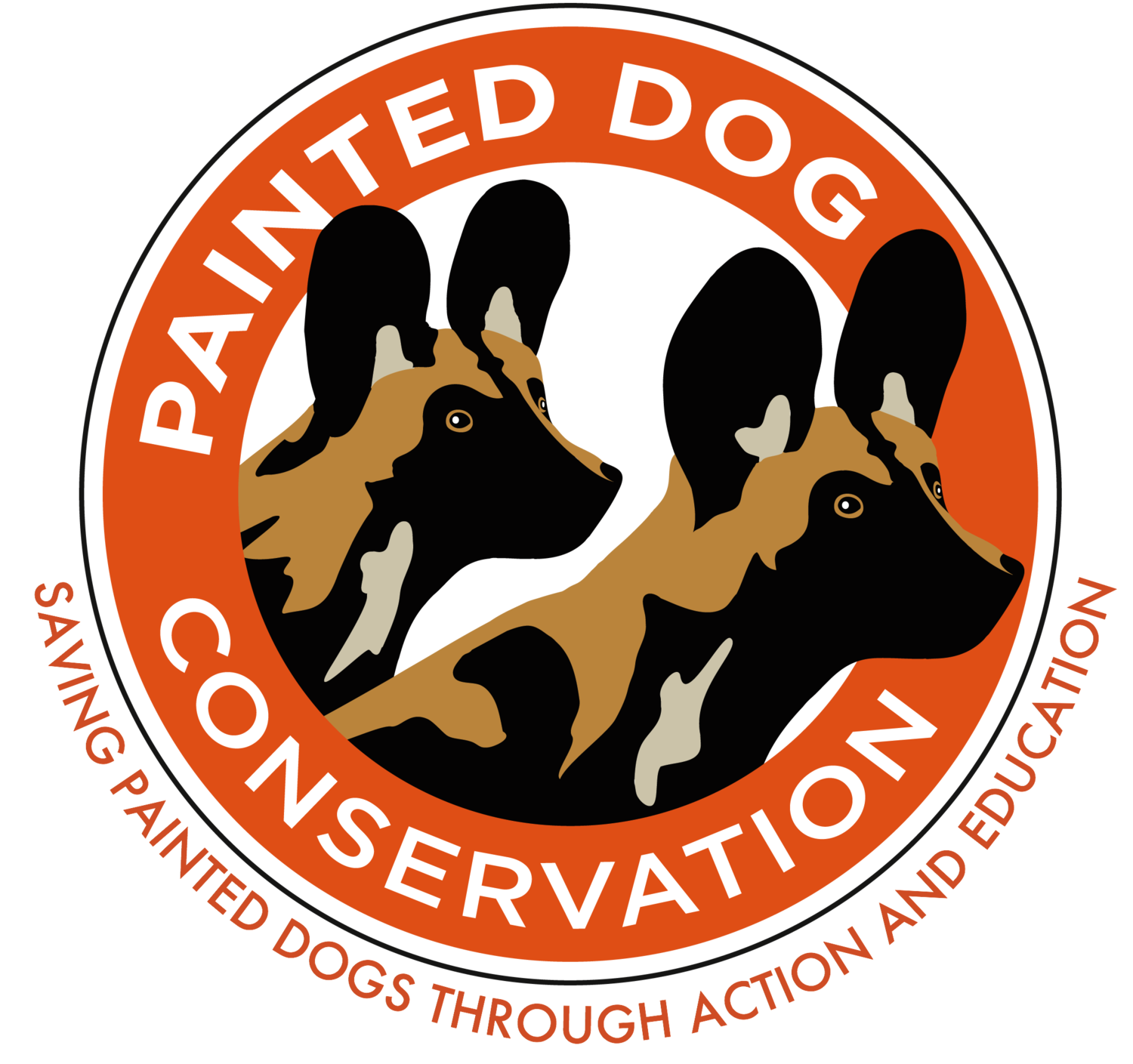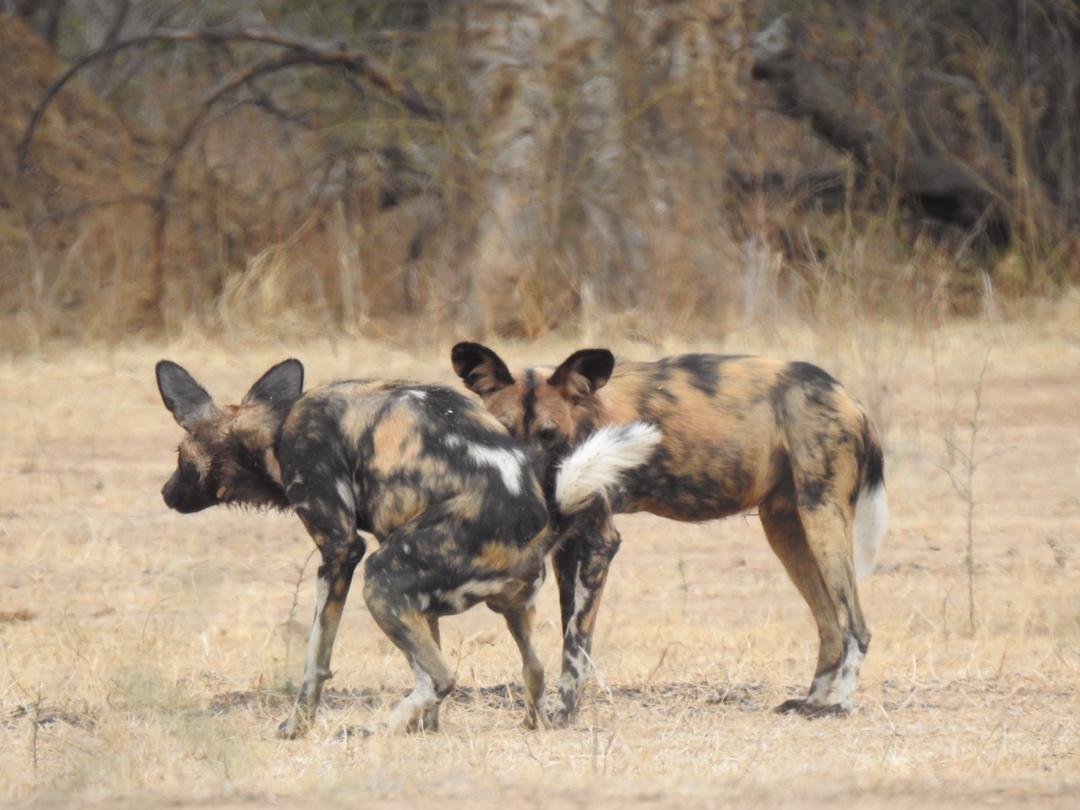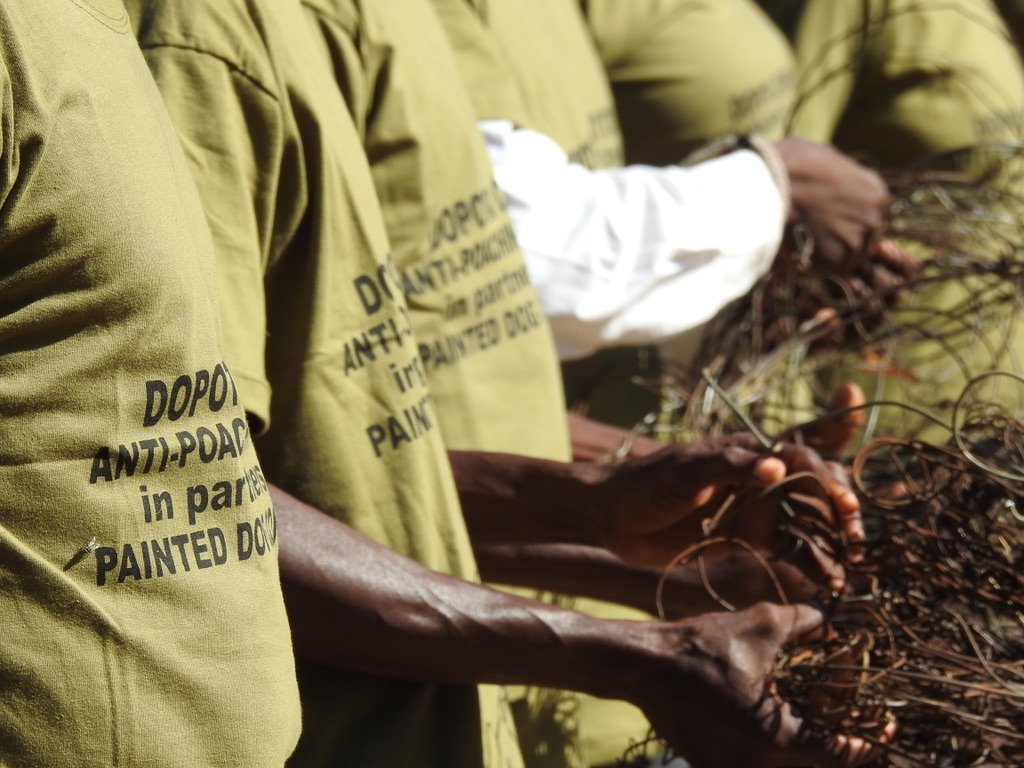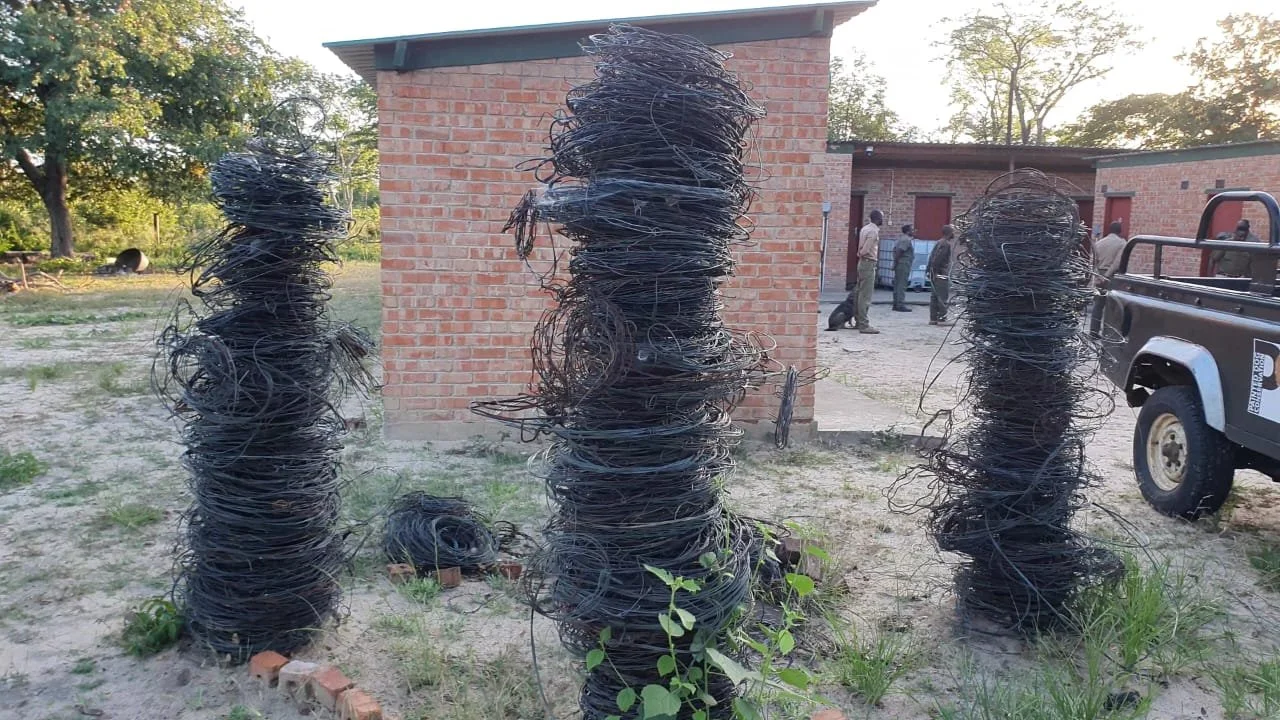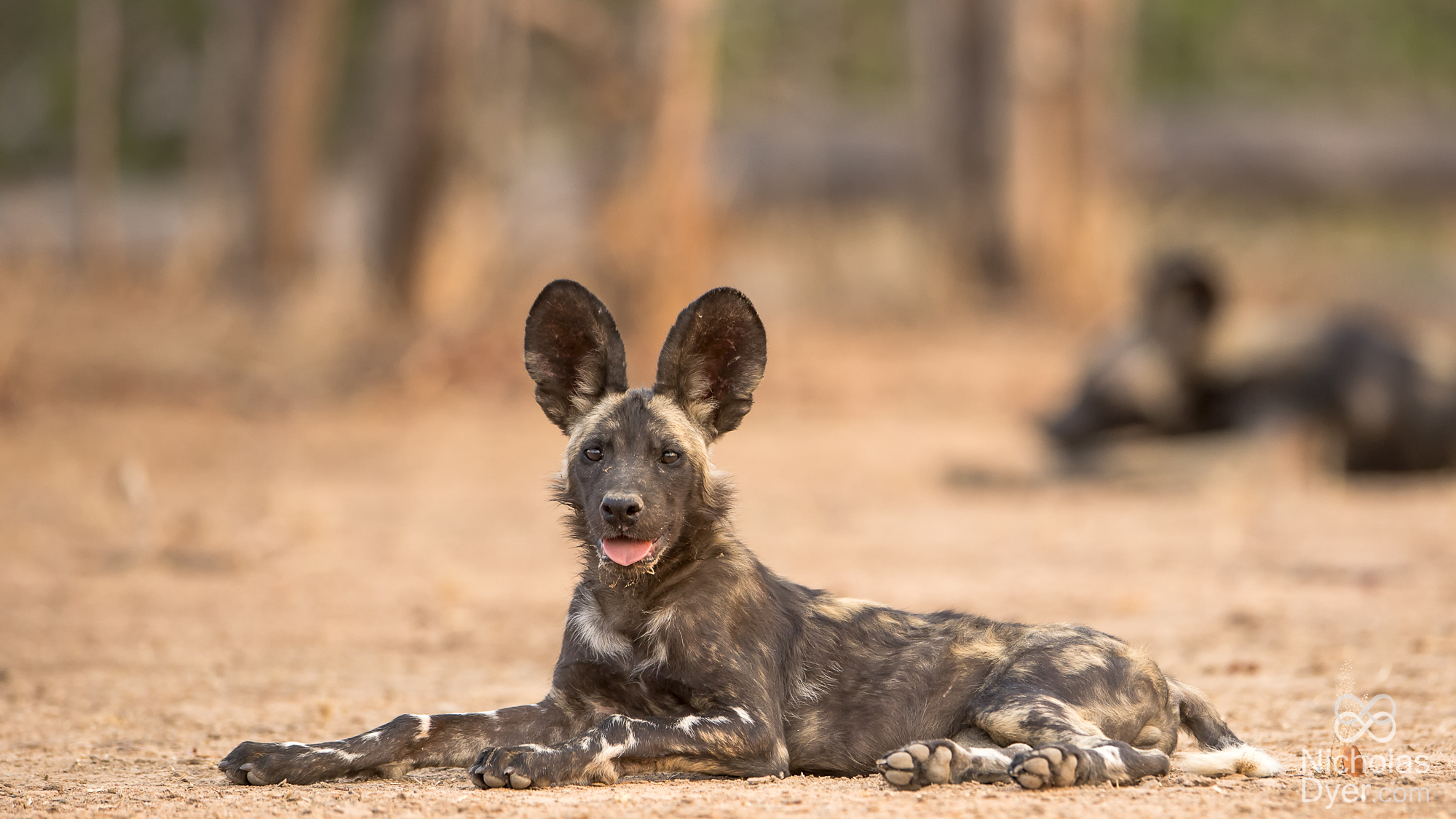
News Updates
Notes from the Field: Denning and Inbreeding
The tale of the Mpindothela has taken a better twist this time around. Clara, the pack's alpha female, now has pups, and the pack is denning. The Mpindothela pack is a merger of the four males from the Mathathela pack, which used to roam near our headquarters in Dete and the four remaining females of the notorious Mpindo pack.
Clara earlier in the year
The tale of the Mpindothela has taken a better twist this time around. Clara, the pack's alpha female, now has pups, and the pack is denning. The Mpindothela pack is a merger of the four males from the Mathathela pack, which used to roam near our headquarters in Dete and the four remaining females of the notorious Mpindo pack. The pack formed when we released the Mpindo females to join the waiting males outside our Rehabilitation facility last year.
Looking back, since the pack was formed, the Mpindothela lost its alpha male Khule to a lion attack and a promising female MaDube to a road accident. Their future looked bleak following these incidents. The pack regrouped well, and now with pups comes new hope for the pack and the painted dog population in Hwange.
Pregnant Clara feeding with her pack
In Mana Pools, Boas, the son of Taku and Tafara (born 2020) of the Rucomecci pack, has joined the Nyamepi pack with a male we believe to be his brother, Dickson. In the video below shot by our researchers in Mana Pools, Boas and alpha female Whisky are mating.
Boas and Whisky Mating
While, on the one hand, it's good to see "new" males join the Nyamepi pack after the disappearance of alpha male Gamma in early May and the other four males, it is still a concern because Taku and Whisky, are sisters. So Boas is a close relative, indeed nephew of Whisky.
This continues a worrying trend in Mana pools of an apparent lack of "new blood" migrating into the area.
Boas and Whisky
In Partnership with the Community
No matter how much progress we make with the dogs, it’s no use if we work in isolation from the surrounding communities. In 2020 and in 2021 we had a mutually beneficial and successful operation in collaboration with the Mabale Community Anti-poaching Volunteers. This year, we got funding to engage the Mabale Community Anti-Poaching Unit volunteers for another six months. Keeping our foot on the pedal by having and maintaining a heavy presence on the ground.
Mabale Community Anti-Poaching Unit Volunteers
No matter how much progress we make with the dogs, it’s no use if we work in isolation from the surrounding communities. In 2020 and in 2021 we had a mutually beneficial and successful operation in collaboration with the Mabale Community Anti-Poaching Unit (MCAPU) This year, we have again got funding to engage the MCAPU for another six months. Keeping our foot on the pedal, so to speak, by having and maintaining a solid presence on the ground.
In 2020, we saw an escalation of poaching activities in the areas bordering Hwange National Park due to hardships caused by the COVID-19 pandemic. We formally engaged the 45-strong MCAPU, mainly women, whose children benefit most from our Children’s Bush Camp. We deployed the MCAPU in areas outside their community to assist our 16-strong professional Anti Poaching Unit. We gave them a daily stipend for these patrols to support their families. This collaboration resulted in a record +5000 snares being recovered in three months, more than double the average number of snares collected annually.
In 2021, thanks to your generous support, we again engaged the MCAPU for six months. We managed to maintain a presence and pressure in the field, which reduced poaching activity. As a result, only 2000 snares were collected. The MCAPU's life-saving work provided a blanket of protection for all wildlife in the area. The stipend they received significantly boosted the local economy at a time when opportunities were scarce from the impacts of lockdowns due to the COVID-19 pandemic.
It is worth noting that many communities in our core operating area are replicating the efforts of the Mabale Community and making their villages safe for livestock and wildlife. These communities living on the edge of Hwange National Park are prone to human-wildlife conflict incidents. Sianyanga community is the latest to show interest and set up a voluntary community anti-poaching unit.
PDC Anti-Poaching Unit Manager Enock Zulu Addresses Community Volunteers
We haven’t been spared from the escalating costs of operations due to fuel price increases. A huge financial backing is needed to do the work we do. We were very pleased and grateful to receive 296 food ration for our Anti-Poaching scouts from the French Embassy in Zimbabwe. The work at hand is still daunting, we continue to call for increased support for us to continue with this critical and life-saving work not only for us but for the generation to come.
Resolute in Protecting Painted Dogs and Wildlife
Anti-poaching is a complementary and essential effort in the holistic approach we have employed to try and save painted dogs from extinction. Our team of highly trained scouts have been in the field since 2001, removing the indiscriminate and deadly snares and arresting poachers.
Snare wire piles at Painted Dog Conservation anti-poaching base
Anti-poaching is a complementary and essential effort in the holistic approach we have employed to try and save painted dogs from extinction. Our team of highly trained scouts have been in the field since 2001, removing the indiscriminate and deadly snares and arresting poachers.
During the first quarter of 2022, our scouts conducted 262 patrols covering an area of 1422km2. They recovered 319 snares and made 2 arrests.
The community anti-poaching teams that were formed to complement PDC’s effort continue to grow as more and more people in the nearby villages display positive attitudes towards wildlife. All three Community teams comprising Mabale, Dopota and Nabushome carried out their voluntary patrols without any adverse reports. The Sianyanga community has now also indicated their intention by formalising their team and work. Sianyanga has four forest land areas around their village which need monitoring due to the frequent presence of wildlife therein and the threats by poachers to both wildlife and livestock.
This brings the total of Community APU members to 187.
A pack of painted dogs
Enock Zulu demonstrates how to use the Trimble gadget and SMART software
We trained the Mabale, Nabushome and Dopota teams to use the Trimble device and the SMART data collection software to better record their patrols and findings. The teams were issued with one device each for use during their patrols and we will undertake the same training with the Sianyanga team.
Dopota Community Anti-poaching Volunteers SMART training
25 Years and Counting...
It seems incredible to think that I’ve been committed to creating an environment where painted dogs can thrive for 25 years now….and counting. I first came out to Zimbabwe in 1997 to see what Greg Rasmussen and his then Painted (Hunting) Dog Research Project were doing. It was the proverbial one-man-band or put another way one man and his dog(s).
Peter Blinston - Executive Director, Painted Dog Conservation
It seems incredible to think that I’ve been committed to creating an environment where painted dogs can thrive for 25 years now….and counting.
I first came out to Zimbabwe in 1997 to see what Greg Rasmussen and his then Painted (Hunting) Dog Research Project were doing. It was the proverbial one-man-band or put another way one man and his dog(s).
I had actually met Greg in Falmouth in January 1997, but the beginning of the journey goes back to June 1996 when I read an article in the Royal Geographical Magazine. The article gave me David Shepherd Foundation as a contact and Mel Shepherd gave me a fax number in Zimbabwe. I guess the rest is history!
Since then I have maintained a single focus to build a robust organisation that is equipped to tackle the multiple challenges of front line conservation.
Chief Nelukoba-Dingani
Key to that has been developing a strong working relationship with our local Chief, Chief Nelukoba, who I first met in 1998. And he has been a resolute spokesperson ever since.
At this stage, I was already talking of the need to create structure and met with lawyer Kevin Arnott in Harare to discuss the options. Soon after that I met Jerry Gotora at a Wildlife Society AGM in Kwekwe and told Greg that Jerry needs to be our Chairman. Happily, Jerry agreed and like Chief Nelukoba he has been a combination of rock and guiding hand on our Board ever since, A Board that has necessarily evolved to also comprise Everisto Marowanyanga as Secretary, Moyra Thain as Treasurer and Chief Nekatambe.
Jealous has been another ever-present and he is also closing in on 25 years and counting…. I remember meeting him for the first time in May 1998, he was cutting the grass at the house we rented. I went into the field with Greg, where we cut or rather attempted to cut a pathway to the den of a painted dog pack. In the evening I was nursing my tattered, blistered, thorn torn hands. In the morning I told Jealous to join us because I knew for sure that he would be better at wielding an axe than me.
Peter Blinston and Senior Tracker Jealous Mpofu in Mana Pools
It was the start of a friendship and trust that has also stood the test of time and a day in the field with him, tracking dogs is a privilege.
The threats to the painted dogs are many. Loss of quality habitat sums it up but it is way more complex than that.
Talk of elephant populations and poaching dominates the landscape. Hwange National Park, where I live, is home to an estimated 40,000 elephants and 200 painted wolves. It is obvious to me which species will win the race to extinction. A race no species wants to be in let alone win.
Peter Blinston darting a painted dog
Immediate action is required as well as a long term strategic approach. I believe that the individual is the key. Changing an individual’s life, be it an individual painted dog or a person can and does make a difference. A life-changing difference. And it’s done, one day at a time, one life at a time. There is no quick fix. There is no simple answer or remedy to saving an endangered species.
I have been challenged physically and emotionally, so many times in the past years. On more occasions than I care to remember I have found myself asking just how much I have to give. Knowing that the answer is always more, more, more.
Peter Blinston, Tracker Washington Moyo and Sam Blinston collaring a painted dog
Even after all the literal, sweat blood and tears that have flown in the past 25 years, I know that the future is still no more certain or secure than it was twenty years ago.
I remain as committed as ever, to building a team, equipped physically and mentally to take on the challenges that lie ahead. The team are all local people, literally, the majority of the 66 staff are from the local villages that surround us. Their development is key to creating the capacity and robustness needed so that Painted Dog Conservation endures as an organisation beyond any one individual
Peter Blinston and Painted Dog Conservation Operations Manager David Kuvawoga
The hill is steep, some say it’s too steep to climb, but I say climb it in your own way. Above all, be determined to reach the top.
Such is life on the front line of conservation, where the future is so uncertain.
